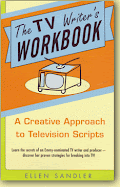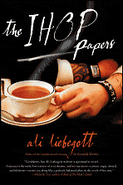Saturday, March 3, 2007
Author Interview With Saint Charles High School Reporter, Bree:
BREE: What is your novel about?
EI: My novel is about a young man's life becoming derailed by forces beyond his control. It begins in the fictional college town of Maizen Beach Florida in 2008. Von Muir Carmichael, my protagonist, is transported back in time to England in 1908, and accused of murder. His forced journey in the story takes him to many places and times in the past as well as the future. Actually Von is symbolic of our time in which young adults are channeled into society with high expectations only to find that despite the reassurances and positive support heaped on them since birth, their lives can still be dictated by circumstance.
BREE: What is it called?
EI: The title of my book is ‘Wireless in the Fabric of Time’.
BREE: How long did it take you to write it (or how long has it taken you?)
EI: It took me four years to write the book. That includes time involved researching facts and acquiring licensing needed to publish the two copyrighted musical lyrics in the book.
BREE: What challenges did you face writing the novel?
EI: Writing at its essence is about communication. I've made the choice to reach out to a larger audience. My biggest challenge in writing this novel was to communicate with the young adult reader, as well as the tech savvy twenty-something reader. BREE: Who or what did you base the main character off of?
EI: My main character, Von Muir Carmichael is an amalgam of many young people I have met in recent years. Hopefully qualities of his character will be familiar and sympathetic to the reader.
BREE: How did you come up with this story?
EI: I want my novels to reflect the life affirming experiences people endure in life – both good and bad. The concept for ‘Wireless’ came to me in reflection just as my only son was preparing to go off to college. The scene in my son’s room, which may have spawned more than just my imagination, could best be described as 21st century teenager, comfortable mayhem. Wires, computers, games, electronic devices of all sorts littered the floor.... My son and his friends seem to embrace this functioning chaos of today’s digital lifestyle as their natural state, or ‘comfort zone.’ I loved when several of his friends would visit our house. The tell-tale sign was the intermittent beeping sounds of IM’s and text messages from cell phones in the middle of the night.
It seemed my son and his peers were always in motion and always connected day or night by their Internet devices. They communicated in cryptic bursts with their own digital lingo punctuated by phrasing like ‘hey dude’, ‘whaz up’, or ‘awesome’, and rapid thumb movements. The story line really came to me by letting my imagination run uninhibited with a series of ‘what if’ scenarios centered on the premise that much of life is determined by how we react to circumstances not of our own making.
BREE: How many different drafts did it take you to reach your final one?
EI: While writing this book, it took about twenty drafts for me to reach the final phase. When I felt comfortable enough to let a stranger read it, I decided it was time to let it go to print. Truthfully I would still be writing and rewriting, if it were not for the encouragement and guidance of my editors.
BREE: What inspired you to write about this topic?
EI: I was inspired by today’s younger generation’s love of electronic gadgets and ease with ever-changing technology. I was also inspired to tell a story that young adults, teens and people who love electronic gadgets would find appealing and creatively challenging. There are very few books written about ‘technology’, and none of them seem to address the way teenagers exist in the world. Virtually all the characters in my book are inspired by people I have known, but I hasten to add that there is a liberal dose of poetic license applied to each most.
BREE: Is this your first novel?
EI: ‘Wireless’ is my second manuscript actually. Life Doesn’t Rewind: in the Rice Paper World was my first project. It’s a story narrated by a woman in her nineties told from her hospital bed in 1995. It recounts the unrequited love story of girl growing up in the Pacific islands, who falls in love with a much older Commodore George Dewey in a tumultuous time, during the Battle of Manila Bay circa 1898.
BREE: When does your novel come out?
EI: My book was released in December ’06. It is now available at Barnes & Noble, Borders, Books A Million, Alibris and Amazon on line.
BREE: What would you say to inspiring authors?
EI: Keep writing as often as you can! A daily writing routine is ideal, pick up a pen, carry a journal or a small laptop. I myself, write about 3000 to 3500 words a day when I am in full writing mode. It’s refreshing. It can be a painful process that sometimes takes me around 4 hours to 6 hours. At the start of my day, very early in the morning, I edit what I've written the previous day. I really find reading it the next day always brings fresh perspective. The thing is.... it’s similar in many ways to learning a foreign language, or playing your favorite musical instrument. Practice and discipline are key. Also, if you’ve got the time and you’re serious about writing, tell your parents to take you to a writer’s workshop. It can be a huge help with motivation. I do think that for certain writers, writing programs can nurture and sustain the writing skills. I do believe that wonderful writer have come out of them. But I also understand that wonderful writers can come from anywhere. Bree, Just for the record, even when I am not in full writing mode, I still write on almost a daily basis.
I would suggest that an aspiring writer like you should try to read like a writer. Always be critical. You should reread a passage from books you love and never forget to ask yourself, what is the author doing that’s working well. And if you see that there’s something that you think is wrong, ask yourself, why do you think its bad, and what could you have done differently to make it better?
An old mentor from Nantucket once said to me.... Before you get to do your art, you have to master your craft. You see... Writing is art. If you look at it this way...the definition of art and craft is the continuity and it is clearly a work in progress. Art is a unique expression of self. Craft is more about technique and I really do believe it can be learned with discipline and practice. Best of luck to you!
EI: My novel is about a young man's life becoming derailed by forces beyond his control. It begins in the fictional college town of Maizen Beach Florida in 2008. Von Muir Carmichael, my protagonist, is transported back in time to England in 1908, and accused of murder. His forced journey in the story takes him to many places and times in the past as well as the future. Actually Von is symbolic of our time in which young adults are channeled into society with high expectations only to find that despite the reassurances and positive support heaped on them since birth, their lives can still be dictated by circumstance.
BREE: What is it called?
EI: The title of my book is ‘Wireless in the Fabric of Time’.
BREE: How long did it take you to write it (or how long has it taken you?)
EI: It took me four years to write the book. That includes time involved researching facts and acquiring licensing needed to publish the two copyrighted musical lyrics in the book.
BREE: What challenges did you face writing the novel?
EI: Writing at its essence is about communication. I've made the choice to reach out to a larger audience. My biggest challenge in writing this novel was to communicate with the young adult reader, as well as the tech savvy twenty-something reader. BREE: Who or what did you base the main character off of?
EI: My main character, Von Muir Carmichael is an amalgam of many young people I have met in recent years. Hopefully qualities of his character will be familiar and sympathetic to the reader.
BREE: How did you come up with this story?
EI: I want my novels to reflect the life affirming experiences people endure in life – both good and bad. The concept for ‘Wireless’ came to me in reflection just as my only son was preparing to go off to college. The scene in my son’s room, which may have spawned more than just my imagination, could best be described as 21st century teenager, comfortable mayhem. Wires, computers, games, electronic devices of all sorts littered the floor.... My son and his friends seem to embrace this functioning chaos of today’s digital lifestyle as their natural state, or ‘comfort zone.’ I loved when several of his friends would visit our house. The tell-tale sign was the intermittent beeping sounds of IM’s and text messages from cell phones in the middle of the night.
It seemed my son and his peers were always in motion and always connected day or night by their Internet devices. They communicated in cryptic bursts with their own digital lingo punctuated by phrasing like ‘hey dude’, ‘whaz up’, or ‘awesome’, and rapid thumb movements. The story line really came to me by letting my imagination run uninhibited with a series of ‘what if’ scenarios centered on the premise that much of life is determined by how we react to circumstances not of our own making.
BREE: How many different drafts did it take you to reach your final one?
EI: While writing this book, it took about twenty drafts for me to reach the final phase. When I felt comfortable enough to let a stranger read it, I decided it was time to let it go to print. Truthfully I would still be writing and rewriting, if it were not for the encouragement and guidance of my editors.
BREE: What inspired you to write about this topic?
EI: I was inspired by today’s younger generation’s love of electronic gadgets and ease with ever-changing technology. I was also inspired to tell a story that young adults, teens and people who love electronic gadgets would find appealing and creatively challenging. There are very few books written about ‘technology’, and none of them seem to address the way teenagers exist in the world. Virtually all the characters in my book are inspired by people I have known, but I hasten to add that there is a liberal dose of poetic license applied to each most.
BREE: Is this your first novel?
EI: ‘Wireless’ is my second manuscript actually. Life Doesn’t Rewind: in the Rice Paper World was my first project. It’s a story narrated by a woman in her nineties told from her hospital bed in 1995. It recounts the unrequited love story of girl growing up in the Pacific islands, who falls in love with a much older Commodore George Dewey in a tumultuous time, during the Battle of Manila Bay circa 1898.
BREE: When does your novel come out?
EI: My book was released in December ’06. It is now available at Barnes & Noble, Borders, Books A Million, Alibris and Amazon on line.
BREE: What would you say to inspiring authors?
EI: Keep writing as often as you can! A daily writing routine is ideal, pick up a pen, carry a journal or a small laptop. I myself, write about 3000 to 3500 words a day when I am in full writing mode. It’s refreshing. It can be a painful process that sometimes takes me around 4 hours to 6 hours. At the start of my day, very early in the morning, I edit what I've written the previous day. I really find reading it the next day always brings fresh perspective. The thing is.... it’s similar in many ways to learning a foreign language, or playing your favorite musical instrument. Practice and discipline are key. Also, if you’ve got the time and you’re serious about writing, tell your parents to take you to a writer’s workshop. It can be a huge help with motivation. I do think that for certain writers, writing programs can nurture and sustain the writing skills. I do believe that wonderful writer have come out of them. But I also understand that wonderful writers can come from anywhere. Bree, Just for the record, even when I am not in full writing mode, I still write on almost a daily basis.
I would suggest that an aspiring writer like you should try to read like a writer. Always be critical. You should reread a passage from books you love and never forget to ask yourself, what is the author doing that’s working well. And if you see that there’s something that you think is wrong, ask yourself, why do you think its bad, and what could you have done differently to make it better?
An old mentor from Nantucket once said to me.... Before you get to do your art, you have to master your craft. You see... Writing is art. If you look at it this way...the definition of art and craft is the continuity and it is clearly a work in progress. Art is a unique expression of self. Craft is more about technique and I really do believe it can be learned with discipline and practice. Best of luck to you!
Subscribe to:
Post Comments (Atom)











.png)

















No comments:
Post a Comment